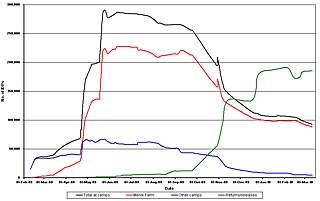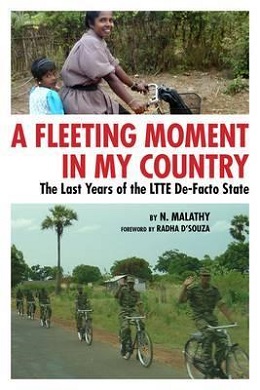Related Research Articles

The Liberation Tigers of Tamil Eelam was a Tamil militant organization that was based in the northern and eastern Sri Lanka. The LTTE fought to create an independent Tamil state called Tamil Eelam in the northeast of the island in response to violent persecution and discriminatory policies against Sri Lankan Tamils by the Sinhalese-dominated Sri Lankan Government.

The Sri Lankan Civil War was a civil war fought in Sri Lanka from 1983 to 2009. Beginning on 23 July 1983, it was an intermittent insurgency against the government by the Velupillai Prabhakaran-led Liberation Tigers of Tamil Eelam. The LTTE fought to create an independent Tamil state called Tamil Eelam in the north-east of the island, due to the continuous discrimination and violent persecution against Sri Lankan Tamils by the Sinhalese-dominated Sri Lanka government.

TamilNet is an online newspaper that provides news and feature articles on current affairs in Sri Lanka, specifically related to the erstwhile Sri Lankan Civil War. The website was formed by members of the Sri Lankan Tamil community residing in the United States and publishes articles in English, German and French.

Operation Poomalai, also known as Eagle Mission 4, was the codename assigned to a mission undertaken by the Indian Air Force for airdropping supplies over the besieged town of Jaffna in Sri Lanka on 4 June 1987 to support the Tamil Tigers during the Sri Lankan Civil War.

Tamil Eelam is a proposed independent state that many Tamils in Sri Lanka and the Eelam Tamil diaspora aspire to create in the north and east of Sri Lanka. Large sections of the North-East were under de facto control of the Liberation Tigers of Tamil Eelam (LTTE) for most of the 1990s–2000s during the Sri Lankan Civil War. Tamil Eelam, although encompassing the traditional homelands of Eelam Tamils, does not have official status or recognition by world states. The name is derived from the ancient Tamil name for Sri Lanka, Eelam.
The North-East Secretariat on Human Rights (NESoHR) was established on July 9, 2004, in Kilinochchi by the Liberation Tigers of Tamil Eelam (LTTE) as part of the 2002 Norway-facilitated peace process to monitor human rights in the North Eastern Province, Sri Lanka. According to its former secretary N. Malathy, who volunteered and worked closely with the LTTE Peace Secretariat to assist with the peace process, some leading members of citizens' committees in the North-East collectively put pressure on the LTTE to establish a civilian human rights body independent of the LTTE Peace Secretariat.

The Chencholai bombing took place on August 14, 2006 when the Sri Lankan Air Force bombed what it said was a rebel Liberation Tigers of Tamil Eelam (LTTE) training camp, killing 61 girls aged 16 to 18. The LTTE, UNICEF, the Sri Lanka Monitoring Mission and UTHR all said those in the compound were not LTTE cadres.
British Tamils Forum or BTF, is a largest organisation representing the Tamil Community in the United Kingdom. The BTF intends to be the voice of the Tamil Community in the UK by raising the issues on Tamils in UK and to bring awareness to the issues affecting Tamil people in the island of Sri Lanka and around the world. The BTF's work is focused on addressing the root cause to the conflict through an international justice mechanism to bring truth and justice to all victims of war and to bring end to the entrenched culture of impunity in Sri Lanka.
Sivanathan Kishore is a Sri Lankan Tamil politician and former Member of Parliament.
Between 2008 and 2009, major protests against the Sri Lankan Civil War took place in several countries around the world, urging national and world leaders and organisations to take action on bringing a unanimous cease fire to the Sri Lankan Civil War, which had taken place for twenty-six years. Tamil diaspora populations around the world expressed concerns regarding the conduct of the civil war in the island nation of Sri Lanka. The civil war, which took place between the Sri Lankan Army and the separatist group Liberation Tigers of Tamil Eelam is believed to have killed over 100,000 civilians. Protesters and critics of the Sri Lankan government that triggered a culturally based civil war to be a systematic genocide and ethnic cleansing of the Sri Lankan Tamil minority in Sri Lanka.

The final stages of the Sri Lankan Civil War created 300,000 internally displaced persons (IDPs) who were transferred to camps in Vavuniya District and detained there against their will. This process, together with conditions inside the camps and the slow progress of resettlement attracted much concern and criticism from inside and outside Sri Lanka. On 7 May 2009 the Sri Lankan government announced plans to resettle 80% of the IDPs by the end of 2009. After the end of the civil war Sri Lankan President Mahinda Rajapaksa gave assurances to foreign diplomats that the bulk of the IDPs would be resettled in accordance with the 180-day plan. On 1 December 2009, the IDPs were given limited freedom of movement. The pace of resettlement increased in 2010. The resettlement process was completed and camps were officially closed on 25 September 2012. However, the final batch of IDPs consisting of 110 families were relocated in Kepapilavu in Mullaitivu District-away from their original homes.
Tim Martin is the Director of the Human Rights Campaign group Act Now. As a former British humanitarian aid worker who worked in Sri Lanka, Martin founded Act Now with fellow aid workers after seeing human rights violations and mass killing in Sri Lanka against Tamils. In 2009, Martin went on a 21-day fast outside British Parliament to protest against the killing of Tamils in Sri Lanka.
War crimes during the final stages of the Sri Lankan Civil War are war crimes and crimes against humanity which the Sri Lanka Armed Forces and the Liberation Tigers of Tamil Eelam have been accused of committing during the final months of the Sri Lankan Civil War in 2009. The war crimes include attacks on civilians and civilian buildings by both sides; executions of combatants and prisoners by both sides; enforced disappearances by the Sri Lankan military and paramilitary groups backed by them; sexual violence by the Sri Lankan military; the systematic denial of food, medicine, and clean water by the government to civilians trapped in the war zone; child recruitment, hostage taking, use of military equipment in the proximity of civilians and use of forced labor by the Tamil Tigers.
The Report of the Secretary-General's Panel of Experts on Accountability in Sri Lanka was a 2011 report produced by a panel of experts appointed by United Nations Secretary-General (UNSG) Ban Ki-moon to advise him on the issue of accountability with regard to any alleged violations of international human rights and humanitarian law during the final stages of the Sri Lankan Civil War. The report is referred to by some as the Darusman Report, after the name of the chairman of the panel.
I Witnessed Genocide: Inside Sri Lanka's Killing Fields is a 2011 investigative documentary film by Ms. Priyamvatha of the Indian news channel Headlines Today. Ms. Priyamvatha went undercover to the Vanni to report on the survivors of the Sri Lankan Civil War.
Sexual violence against Tamils in Sri Lanka has occurred repeatedly during the island's long ethnic conflict. The first instances of rape of Tamil women by Sinhalese mobs were documented during the 1958 anti-Tamil pogrom. This continued in the 1960s with the deployment of the Sri Lankan Army in Jaffna, who were reported to have molested and occasionally raped Tamil women.
Vanniasingham Vigneswaran was a Sri Lankan Tamil politician and president of the Trincomalee District Tamil Peoples' Forum. He was selected as the National List Member of Parliament to replace Joseph Pararajasingham by the Tamil National Alliance who had been assassinated to the Sri Lankan Parliament.

A Fleeting Moment in My Country: The Last Years of the LTTE De-Facto State is a book by Dr N. Malathy who did her PhD in the University of Canterbury in New Zealand. She spent four years from 2005 till 2009 in the then rebel LTTE administered Vanni de facto state as the secretary of the North East Secretariat on Human Rights and thereafter in the LTTE Peace Secretariat. The book deals with experiences of her work in a human rights body, a women's organization, and an orphanage. The life in the rebel held areas and brutal end to the Sri Lankan Civil War in which thousands of Tamils died.
References
- ↑ "About us". www.act-now.info. Archived from the original on 2010-03-08. Retrieved 2010-02-21.
- ↑ "Ben Bradshaw spends Christmas in Sri Lanka despite human rights concerns". Archived from the original on 2011-06-04. Retrieved 2010-02-21.
- ↑ "Act now joins human rights groups across the globe". Archived from the original on 2012-09-11.
- ↑ TamilNet. "TamilNet". www.tamilnet.com.
- ↑ Act NOW National Boycott Archived July 28, 2011, at the Wayback Machine
- ↑ Global Appeal Launch Event for the ‘Mercy Mission to Vanni [ permanent dead link ]
- ↑ "Sri Lanka holds 'Tamil aid ship'". BBC. 5 June 2009. Retrieved 17 August 2015.
- ↑ "Tamil demonstrators say Times report backs massacre claims". Archived from the original on 2011-06-04. Retrieved 2015-08-17.
- ↑ "Activist seized from lawyer's car in Sri Lanka". Mark Tran. The Guardian. 20 May 2009. Retrieved 17 August 2015.
- ↑ "Tamil woman raped by Sri Lankan soldiers to be deported". Channel4. 4 July 2014. Retrieved 17 August 2015.
- ↑ "Lanka turns away ship carrying aid for displaced Tamils". Times of India. 22 June 2009. Retrieved 17 August 2015.
- ↑ "British celebrities, MPs endorse Mercy Mission to Vanni". Tamilnet. 1 April 2009. Retrieved 17 August 2015.
- ↑ "Sri Lanka says British aid destined for Tamil civilians could be cover for weapons Celebrities and politicians gather in London to publicise humanitarian voyage". Sam Jones. The Guardian. 1 April 2009. Retrieved 18 August 2015.